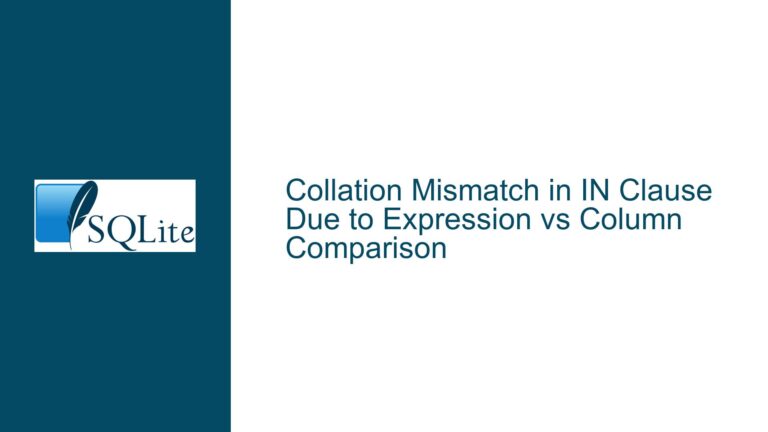SQLite SELECT Nuances, GROUP BY Arbitrary Selection, and Key Constraints
Interpreting SQLite SELECT Clause Semantics and Result Generation
Issue Overview
The core theoretical challenges in this discussion revolve around three interconnected areas of SQLite syntax and behavior:
- Ambiguity in Expression Contexts – Specifically, confusion around where
*andalias.*can be used (e.g., in SELECT result lists vs. other clauses like FROM). - Determinism vs. Arbitrary Selection in GROUP BY – Understanding why non-aggregated columns in grouped queries return values from "arbitrarily selected" rows.
- Alias Collation in ORDER BY and Key Constraints – Clarifying how aliases interact with collation sequences, and the practical role of PRIMARY KEY and FOREIGN KEY constraints.
These issues stem from gaps between the SQLite documentation’s technical phrasing and a beginner’s mental model of relational database operations. For example, the manual states that * or alias.* can only appear in the result expression list (between SELECT and FROM), but beginners might misinterpret this as prohibiting their use in the FROM clause for table aliases. Similarly, terms like "arbitrarily selected" in GROUP BY documentation create confusion about SQLite’s internal row selection logic.
The confusion around PRIMARY KEY and FOREIGN KEY arises from a lack of context about relational database design principles. Beginners often struggle to see why these constraints matter if the database "works" without them. For instance, a PRIMARY KEY enforces row uniqueness, while a FOREIGN KEY ensures referential integrity between tables – concepts that are abstract until demonstrated with concrete examples.
Root Causes of Misinterpretation and Unexpected Behavior
Possible Causes
Misunderstanding Expression Contexts
*andalias.*Usage: The error message about*being invalid outside the result expression list conflicts with the valid use of table aliases in the FROM clause (e.g.,FROM table1 AS t1). This arises becausealias.*in the FROM clause refers to the table structure, not a wildcard expansion. The manual’s phrasing assumes prior knowledge of how aliases bind to table structures.- Result Expression List vs. Other Clauses: The result expression list (SELECT clause) defines the output columns, while other clauses (WHERE, GROUP BY) operate on input rows. Using
*in the latter would imply expanding columns dynamically during filtering/grouping, which SQLite prohibits to avoid ambiguity.
GROUP BY’s "Arbitrary Selection" Mechanism
- Query Planner Determinism: SQLite’s query planner selects rows for non-aggregated columns in grouped queries based on internal optimizations (e.g., index order, storage layout). While this selection is deterministic for a fixed dataset and schema, it appears "arbitrary" to users because the logic is opaque and subject to change with data/schema modifications.
- Lack of Explicit Control: Unlike some databases that require all non-aggregated columns to be in GROUP BY (ANSI SQL mode), SQLite allows "bare" columns, leaving their values up to the query planner. This flexibility is convenient but risks unexpected results if users assume a specific row is chosen.
Alias Collation and Key Constraints
- Collation Inheritance: When an ORDER BY clause references a column alias (e.g.,
SELECT col1 AS c ORDER BY c), SQLite applies the collation of the original column (col1). However, if the alias refers to an expression (e.g.,SELECT col1 || col2 AS c), no default collation exists, leading to binary comparison unless explicitly specified. - Key Constraint Misconceptions: PRIMARY KEY and FOREIGN KEY constraints enforce data integrity rules that are not immediately visible in simple queries. Without these constraints, duplicates or orphaned rows can creep in, causing logical errors in applications that assume uniqueness or relationships.
- Collation Inheritance: When an ORDER BY clause references a column alias (e.g.,
Resolving Ambiguities and Implementing Best Practices
Troubleshooting Steps, Solutions & Fixes
1. Clarifying * and alias.* Usage
- Rule of Thumb: Use
*oralias.*only in the SELECT clause to avoid errors. For example:-- Valid: Expanding all columns from 't1' alias in SELECT SELECT t1.* FROM table1 AS t1; -- Invalid: Using '*' in WHERE clause SELECT * FROM table1 WHERE * = 1; -- Error - FROM Clause Aliases: When you write
FROM table1 AS t1,t1is a table alias, not a column wildcard. It binds to the table’s schema, allowing column references liket1.col1but nott1.*outside the SELECT clause.
2. Demystifying GROUP BY’s Arbitrary Selection
- Understanding Determinism: If the dataset, schema, and SQLite version remain constant, the "arbitrary" value will consistently come from the same row due to deterministic query planning. For example:
-- Returns one row per group, with 'value' from an arbitrary row SELECT category, value FROM sales GROUP BY category;Here,
valueis picked from the first row SQLite encounters for eachcategorygroup, which depends on storage order or index usage. - Mitigation Strategies:
- Aggregate Functions: Use
MAX(),MIN(), orGROUP_CONCAT()to control the output:SELECT category, MAX(value) FROM sales GROUP BY category; - Avoid Bare Columns: In strict mode, enable
SQLITE_SELECT_WITHOUT_FROMto enforce ANSI SQL behavior, requiring all non-aggregated columns to be in GROUP BY.
- Aggregate Functions: Use
3. Aliases and Collation in ORDER BY
- Column Aliases: When an alias refers directly to a column, collation is inherited:
SELECT name COLLATE NOCASE AS n FROM users ORDER BY n; -- Uses NOCASE collation - Expression Aliases: For computed values, explicitly specify collation:
SELECT name || address AS info FROM users ORDER BY info COLLATE NOCASE;
4. PRIMARY KEY and FOREIGN KEY Essentials
- PRIMARY KEY: Uniquely identifies rows. Use
WITHOUT ROWIDto enforce uniqueness on specified columns:CREATE TABLE users ( id INTEGER PRIMARY KEY, -- Implicit unique row identifier email TEXT UNIQUE -- Explicit unique constraint ) WITHOUT ROWID; - FOREIGN KEY: Enforces relationships between tables. Enable with
PRAGMA foreign_keys = ON;:CREATE TABLE orders ( order_id INTEGER PRIMARY KEY, user_id INTEGER REFERENCES users(id) -- Ensures user_id exists in users ); - Practical Benefits:
- Prevent Duplicates:
PRIMARY KEYblocks duplicate entries. - Cascade Actions:
FOREIGN KEYcan automate updates/deletes:CREATE TABLE orders ( ... user_id INTEGER REFERENCES users(id) ON DELETE CASCADE );
- Prevent Duplicates:
Final Recommendations
- Explicit Column Lists: Avoid
SELECT *in production code to shield against schema changes. - Aggregate All Non-Grouped Columns: Prevent unpredictable values in GROUP BY queries.
- Enable Foreign Keys: Always activate
PRAGMA foreign_keysto enforce relational integrity.
By addressing these areas systematically, users can transition from confusion to mastery, leveraging SQLite’s flexibility while avoiding common pitfalls.






